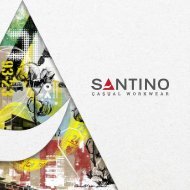Brochures-2016-Santino
Create successful ePaper yourself
Turn your PDF publications into a flip-book with our unique Google optimized e-Paper software.
santino ®<br />
Responsibility BSCI, reach & OEko-tex<br />
DE / Unternehmen verantwortlicher Art<br />
Wir bei <strong>Santino</strong> fühlen uns für unser Lebensumfeld<br />
verantwortlich. Daher führen wir seit langem eine aktive<br />
Unternehmenspolitik im Hinblick auf unsere soziale<br />
Verantwortung.<br />
Der Mensch im Unternehmen<br />
<strong>Santino</strong> unterschreibt vollumfänglich die Zielsetzungen,<br />
die von der Internationalen Arbeitsorganisation<br />
ILO (International Labour Organization) in deren<br />
Konventionen über soziale Arbeitsbedingungen und<br />
gesellschaftlich-soziale Umstände formuliert wurden.<br />
Hierzu zählen unter anderem Kinderarbeit und<br />
Diskriminierung.<br />
<strong>Santino</strong> ist ein Handelsunternehmen, das Textilien von<br />
Herstellern aus den Ländern Bangladesch, China, Indien,<br />
der Türkei und Portugal bezieht. Es ist uns überaus<br />
wichtig, dass bei allen unseren Geschäftsaktivitäten<br />
jederzeit die international geltenden Normen und<br />
Werte beachtet werden. 2007 hat <strong>Santino</strong> in diesem<br />
Zusammenhang einen Verhaltenskodex, den ‘Code<br />
of Conduct’, aufgestellt, der unter allen Umständen<br />
einzuhalten ist und der für alle Fabriken gilt, in denen<br />
unsere Produkte hergestellt werden.<br />
In den Verträgen, die jedes Jahr mit unseren Lieferanten<br />
abgeschlossen werden, werden auch die Bestimmungen<br />
dieses Verhaltenskodex’ verankert. Der vorgenannte<br />
‘Code of Conduct’ ist ein wesentlicher Bestandteil<br />
unserer Allgemeinen Geschäftsbedingungen für den<br />
Einkauf und die Lieferung von Waren (’General Terms<br />
and Conditions for Purchase and Deliveries’). Diese<br />
Allgemeinen Geschäftsbedingungen werden von den<br />
Lieferanten unterschrieben, die mit ihrer Unterschrift<br />
ihr Einverständnis mit diesen Bestimmungen bestätigen.<br />
Unsere Handelsvertreter, die in unseren Einkaufszentralen<br />
in den betreffenden Produktionsländern tätig sind,<br />
kontrollieren dass diese Auflagen und Bedingungen auch<br />
tatsächlich erfüllt werden.<br />
BSCI<br />
(Initiative, die Wirtschaftsunternehmen eine Plattform<br />
zur Verbesserung der sozialen Standards in einer<br />
weltweiten Wertschöpfungskette bietet)<br />
Für <strong>Santino</strong> ist es nicht nur selbstverständlich, sich zu<br />
seiner eigenen sozialen Verantwortung zu bekennen<br />
und diese auch umzusetzen. <strong>Santino</strong> ist zudem auch<br />
Mitglied in der vorgenannten Initiative BSCI (Business<br />
Social Compliance Initiative). Diese Initiative setzt sich<br />
weltweit für die Verbesserung der Arbeitsbedingungen<br />
im internationalen Handelsverkehr ein.<br />
BSCI führt zunehmend Kontrollen bei den Lieferanten<br />
durch, um zu prüfen, welche Maßnahmen von diesen<br />
seit der letzten Kontrolle getroffen wurden, um die<br />
Arbeitsbedingungen zu verbessern. Es handelt sich<br />
folglich nicht um ein Zertifizierungssystem, sondern<br />
um eine Methode, um bei den Lieferanten schrittweise<br />
Verbesserungen zu implementieren und anschließend<br />
zu kontrollieren, ob die vereinbarten Maßnahmen auch<br />
tatsächlich umgesetzt wurden.<br />
Nachhaltig einkaufen<br />
<strong>Santino</strong> kauft nachhaltig ein und achtet hierbei auf die<br />
genaue Einhaltung der internationalen Richtlinien, die in<br />
den “REACH”- und den “Oeko-tex”-Standards festgelegt<br />
wurden.<br />
REACH ist eine EU-Verordnung, die in der<br />
niederländischen Gesetzgebung im Umweltschutzgesetz<br />
(Wet milieubeheer) verankert ist. Ziel des REACH-<br />
Systems ist die Beherrschung der Risiken und Gefahren,<br />
die chemische Stoffe in sich bergen können. Dies<br />
geschieht durch die vorgeschriebene Registrierung,<br />
Bewertung und die etwaige Genehmigung oder ein<br />
entsprechendes Verbot, die betreffenden Stoffe<br />
einzusetzen.<br />
Oekotex beginnt ganz am Anfang. Wird im Hinblick<br />
auf den Einsatz von Chemikalien verantwortungsvoll<br />
verfahren? Im Weiteren wird begutachtet, welche<br />
Stoffe in der Kleidung verarbeitet werden. Sind<br />
diese schädlich für den Verbraucher oder für den<br />
Fabrikarbeiter? Ferner kommt die ‘Leistungsfähigkeit’<br />
der betreffenden Textilien auf den Prüfstand: wie<br />
langlebig ist ein Kleidungsstück und welchen Einfluss<br />
hat ein Waschen der betreffenden Textilien auf die<br />
Umwelt? Muss ein T-Shirt häufig gewaschen werden<br />
oder muss viel Waschmittel zum Waschen verwendet<br />
werden? Sind hohe Temperaturen zum Waschen<br />
erforderlich? In diesen Fällen wären die produzierten<br />
Textilien natürlich schädlicher für die Umwelt.<br />
Textilien dürfen also weder für den Menschen, noch<br />
für die Natur bzw. die Umwelt schädlich sein. All<br />
diese Aspekte werden berücksichtigt, weil es sich<br />
doch so viel besser anfühlt, diese Kleidung zu tragen.<br />
Soziales Engagement<br />
Als Organisation, die inmitten der Gesellschaft agiert,<br />
unterstützt <strong>Santino</strong> wohltätige Zwecke und arbeitet<br />
daher auch mit einigen Sozialorganisationen vor Ort<br />
zusammen. So unterstützen wir unter anderem auch<br />
eine Schule und Studenten in Gambia.<br />
EN / Social responsibility<br />
We feel responsible for our environment at <strong>Santino</strong>.<br />
We have therefore had an active Corporate Social<br />
Responsibility policy in place for a long period of time.<br />
The person in the company<br />
<strong>Santino</strong> endorses the objectives formulated by ILO<br />
Conventions (International Labour Organisation)<br />
in relation to social working conditions and social<br />
circumstances, including child labour and discrimination.<br />
<strong>Santino</strong> is a trading company which purchases textiles<br />
from manufacturers in the countries Bangladesh,<br />
China, India, Turkey and Portugal. We attach a great<br />
deal of value to the fact that international standards<br />
and values are respected in all our business activities<br />
at all times.<br />
<strong>Santino</strong> introduced their Code of Conduct to this effect<br />
in 2007, which needs to be taken into account and which<br />
applies to all factories which manufacture our products.<br />
This Code of Conduct is also stipulated in the contracts<br />
we enter into with our suppliers every year. The Code of<br />
Conduct forms an essential part of our ‘General Terms<br />
and Conditions for Purchase and Deliveries’. These<br />
General Terms and Conditions are signed in agreement<br />
by all our suppliers. Our representatives, active at our<br />
purchasing offices in the production countries, ensure<br />
these requirements are met.<br />
BSCI<br />
In addition to the self-evidence of our own Corporate<br />
Social Responsibility, <strong>Santino</strong> is also a member of<br />
BSCI (Business Social Compliance Initiative). The<br />
Business Social Compliance Initiative commits itself<br />
to globally improving working conditions in the trade.<br />
The BSCI is now increasingly carrying out audits at<br />
suppliers in order to assess which steps have been<br />
taken since the last audit to improve the working<br />
conditions. This is therefore not a certification system,<br />
but a way of implementing step by step improvements<br />
at suppliers and to subsequently check whether these<br />
have been complied with.<br />
Sustainable purchasing<br />
<strong>Santino</strong> has a sustainable purchasing policy in place,<br />
in accordance with the international guidelines set in<br />
“REACH” and “Oeko-tex”.<br />
REACH is an EU regulation which is included in the<br />
Environmental Management Act within the Dutch<br />
law. The aim of the REACH system is to manage the<br />
risks associated with chemical substances. This is<br />
realised through compulsory registration, evaluation<br />
and whether or not the use of these substances is<br />
permitted.<br />
Oeko-tex stands for Eco-textiles. Oekotex starts<br />
at the very beginning. Is proper attention devoted<br />
to the use of chemicals? Which materials are<br />
used in the clothing is subsequently looked into,<br />
are they not hazardous to the consumer or the<br />
factory worker? The focus is then on the textile’s<br />
‘performance level’, how long will a particular<br />
garment last and what effect will the washing<br />
of it have on the environment? If you regularly<br />
have to wash a T-shirt, plus if you need a great<br />
deal of detergent and need to wash it at high<br />
temperatures, it will naturally be more harmful<br />
to the environment. Textiles should therefore not<br />
result in harm to either people or the environment.<br />
All these aspects are taken into consideration and<br />
this certainly makes everything more comfortable<br />
when you come to wear the clothing.<br />
Social responsibility<br />
As an organisation positioned right in the very heart<br />
of society, <strong>Santino</strong> supports or works together with<br />
local charities and social organisations, but we also<br />
send funds to a school and students in Gambia.<br />
108 | santinoresponsibility santinoresponsibility | 109

















